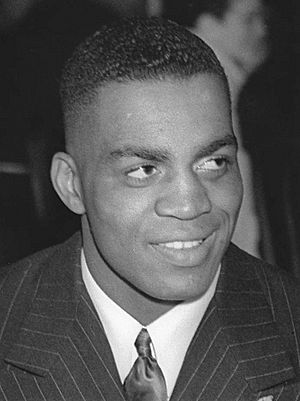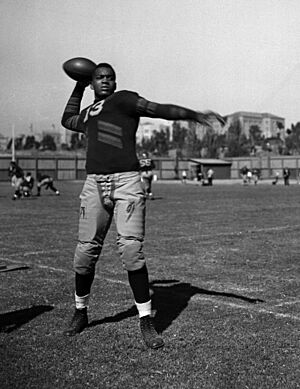Kenny Washington (American football) facts for kids

Washington in 1938
|
|||||||||
| No. 13 | |||||||||
|---|---|---|---|---|---|---|---|---|---|
| Position: | Running back | ||||||||
| Personal information | |||||||||
| Born: | August 31, 1918 Los Angeles, California |
||||||||
| Died: | June 24, 1971 (aged 52) Los Angeles, California |
||||||||
| Height: | 6 ft 3 in (1.91 m) | ||||||||
| Weight: | 237 lb (108 kg) | ||||||||
| Career information | |||||||||
| High school: | Los Angeles (CA) Abraham Lincoln | ||||||||
| College: | UCLA | ||||||||
| Undrafted: | 1940 | ||||||||
| Career history | |||||||||
|
|||||||||
| Career highlights and awards | |||||||||
|
|||||||||
| Career NFL statistics | |||||||||
|
|||||||||
|
College Football Hall of Fame
|
|||||||||
Kenneth Stanley Washington (born August 31, 1918 – died June 24, 1971) was an American football player. He made history as the first African-American player to sign a contract with a National Football League (NFL) team in the modern era, after World War II. Before joining the NFL, he played college football for the UCLA Bruins.
Contents
Early Life and High School Sports
Kenny Washington was born in Los Angeles and grew up in the Lincoln Heights area. His parents, Marian Lenàn and Negro league baseball player Edgar "Blue" Washington, separated when Kenny was young. He was raised by his grandmother, Susie Washington, and his uncle, Rocky. Rocky was the first Black uniformed lieutenant in the Los Angeles Police Department (LAPD).
Kenny was a star athlete at Abraham Lincoln High School. He excelled in both baseball and football. People called him "Kingfish" after a character from a radio show. He led both his baseball and football teams to city championships in the same year.
College Football Star
Washington attended the University of California, Los Angeles (UCLA). He played on both the baseball and football teams. Some people even thought he was a better baseball player than his teammate, Jackie Robinson. There's a story that Brooklyn Dodgers manager Leo Durocher wanted to sign Washington for baseball. But Kenny didn't want to go to Puerto Rico first, so he didn't sign.
In football, Kenny played as a tailback. He was known for both running with the ball and throwing it. He set a school record by rushing for 1,914 yards during his college career. This record stood for 34 years!
The 1939 UCLA Bruins football team was special. It had four African-American players: Kenny Washington, Woody Strode, Jackie Robinson, and Ray Bartlett. Washington, Strode, and Robinson were three of the four main players in the backfield. This was very rare at a time when only a few dozen African-American players were on college football teams.
In 1939, the Bruins played against USC for a chance to go to the 1940 Rose Bowl. The game ended in a 0–0 tie. This was the first UCLA–USC rivalry game that had national importance. Kenny's teammates often talked about how strong he was when facing racial discrimination and insults.
Kenny Washington was the first UCLA player to lead the nation in total offense. He was also the first player from UCLA to be named a consensus All-American in 1939. Even with these achievements, he was only chosen for the second-team All-America. He was also left out of the East–West Shrine Game. Many media outlets were angry about this, saying it was due to racial discrimination.
Time magazine wrote in 1940 that Washington was "considered by West Coast fans the most brilliant player in the US last year." He even appeared in the 1940 movie While Thousands Cheer.
Breaking Barriers in Professional Football
After college, George Halas, who coached the College All-Star Game, wanted Kenny Washington for his Chicago Bears team. However, the NFL was not ready to have Black players yet. So, Washington coached football at UCLA and joined the LAPD.
From 1940 to 1945, Washington played for the Hollywood Bears. This team was part of the Pacific Coast Professional Football League. He was the highest-paid player in the league and earned honors every year. He had a knee injury in his first year, which kept him from serving in the war. In 1945, he did serve in the military on a USO tour. He visited troops and played in exhibition games as a sports ambassador.
When the Cleveland Rams football team moved to Los Angeles, they wanted to play in the Los Angeles Memorial Coliseum. This stadium was built with public money, meaning both Black and white taxpayers paid for it. Because of this, there was pressure for the team to be racially integrated. The Los Angeles Tribune, an African-American newspaper, spoke out strongly. Its sports editor, William Claire "Halley" Harding, pushed for integration.
As a result, the Rams signed Kenny Washington on March 21, 1946. His UCLA teammate, Woody Strode, was signed shortly after on May 7. This was a huge step for racial equality in professional sports.
Before his first NFL season, Washington had surgery on both knees. These were his fifth knee surgeries overall. He had torn cartilage removed from his left knee. Even with these injuries, he played for the Rams for three years. In his second season, he led the league in yards per carry. He even scored a 92-yard touchdown, which is still the Rams' record for the longest run from scrimmage! When he retired in 1948, 80,000 people came to his final game and gave him a standing ovation.
Life After Football
After retiring from football, Kenny Washington returned to work for the LAPD. He also worked for a grocery store chain and a whiskey company. He was a part-time scout for the Los Angeles Dodgers baseball team. His son, Kenny Jr., even played for the Dodgers.
Because of his connections from working at movie studios during college, he also got a few film roles. He appeared in movies like Rope of Sand (1949), Pinky (1949), and The Jackie Robinson Story (1950).
In his younger years, Washington supported the Republican Party. He strongly supported Richard Nixon's 1950 campaign for the U.S. Senate. The night before Nixon won, he spent the evening at Washington's home. However, in the 1960 presidential election, Washington voted for John F. Kennedy instead of Nixon. For the rest of his life, he tended to vote for Democrats, but he never officially joined a political party.
Death
Kenny Washington passed away on June 24, 1971, in Los Angeles, California. He was 52 years old and died from heart and lung problems. He is buried in Evergreen Cemetery.
Lasting Legacy
Kenny Washington's contributions to sports in Los Angeles are remembered. He was honored with a "Court of Honor" plaque at the Los Angeles Memorial Coliseum. He was inducted into the College Football Hall of Fame in 1956. His number 13 jersey was the first to be retired at UCLA, meaning no other player can wear it. He was also inducted into the UCLA Athletic Hall of Fame after his death. His old high school, Abraham Lincoln High School, has given the Kenny Washington Trophy to its best football player every year since 1949.
The experience of Washington and Strode in the NFL, along with Marion Motley and Bill Willis in another league, showed that Black and white athletes could play together in a tough sport without major problems. This helped Branch Rickey, the president of the Brooklyn Dodgers, decide to integrate Major League Baseball. He signed Washington's and Strode's UCLA teammate, Jackie Robinson, to the Dodgers in 1947.
For many years, the NFL didn't give much attention to Kenny Washington's story or the integration of professional football after the war. One reason was that baseball was the most popular sport in the U.S. for most of the 20th century. Also, Washington's NFL career was only three years long. Neither Washington nor Strode has been inducted into the Pro Football Hall of Fame, even though Marion Motley and Bill Willis have. Lincoln High School renamed their stadium after Washington. Every year since 2011, they hold a memorial football game on the anniversary of Washington's death.
See also
 In Spanish: Kenny Washington para niños
In Spanish: Kenny Washington para niños
- List of NCAA major college football yearly total offense leaders


